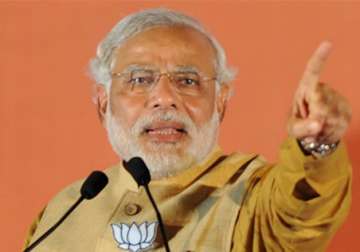Cacophony of Hindutva voices undermines Modi's governance agenda
New Delhi: For a government that assumed office on the promise of good governance and development, the first year in office has been marked by several intemperate remarks on Hindutva from a few BJP ministers,

New Delhi: For a government that assumed office on the promise of good governance and development, the first year in office has been marked by several intemperate remarks on Hindutva from a few BJP ministers, MPs and functionaries.
It was expected that an overwhelming victory at the hustings would give a fillip to undesirable fringes of the ruling Bhartiya Janata Party. But the widespread voicing of the 'Hindu first' agenda, and the resulting muted disavowing by the leaders, may indicate that such thoughts are not marginal for the ruling party.
The 'ghar wapsi' (return to the Hindu fold) campaign and the occasional Hindutva rhetoric from the Sangh Parivar's constituents have sought to divert attention away from the declared governance agenda of the Narendra Modi government.
The first full-majority BJP government at the centre under Modi's leadership apparently evoked a sense of ownership among the constituents of the Sangh Parivar, with Vishwa Hindu Parishad leader Ashok Singhal saying that power in Delhi had come in the hands "of a proud Hindu" after 800 years.
'Sabka Saath, Sabka Vikas'
Modi, who was portrayed as a poster boy of Hindutva and a "polarising figure" by the opposition in the run up to the April-May 2014 Lok Sabha elections, ran his campaign on the agenda of development. Since coming to power, his government has repeatedly emphasised that its philosophy is "Sabka Saath, Sabka Vikas (together with all, progress for all)."
A string of controversies over the past year, however, threatened to take focus away from the government's "good governance" agenda. Right-wing fringe elements, Rashtriya Swayamsevak Sangh (RSS) functionaries and a few BJP ministers and MPs made remarks that created an uproar within and outside parliament.
The ghar wapsi programme in Agra last December, by an outfit linked to the RSS, the ideological fountainhead of the BJP, stoked a major controversy. TV channels brought the event into homes across the country which led to disruptions in parliament, with the government stating that it does not support either conversions or re-conversions. It also suggested a bill against conversions.
Attacks on churches in Delhi also drew wide media attention, with the government clarifying that these had "no communal overtones" and were "law and order problems".
Union Minister Sadhvi Niranjan Jyoti's 'Ramzaadon-versus-haramzaadon" remark, Bharatiya Janata Party MP Sakshi Maharaj terming Mahatma Gandhi's assassin Nathuram Godse as a "patriot" and Union Minister Giriraj Singh's remarks on Congress president Sonia Gandhi's colour of skin kicked up controversies, forcing these parliamentarians to issue regrets.
RSS chief Mohan Bhagwat's purported remarks on Mother Teresa, his views on ghar wapsi and remarks of Sangh functionaries about the cultural identity of Indians being Hindutva also led to controversies.
'Love Jihad'
BJP MP Yogi Adityanath's remarks about "love jihad" and his demand that non-Hindus should be banned from entering Har Ki Pauri in Haridwar also led to criticism from Opposition parties.
Prime Minister Narendra Modi and senior ministers, at internal meetings, expressed unhappiness over the controversial remarks by party MPs. Sakshi Maharaj was issued a show cause notice for his suggestion that Hindu women should have four children.
Sanjay Raut, a Rajya Sabha MP of the Shiv Sena, which is part of ruling National Democratic Alliance, stoked a major controversy with his remarks that voting rights of Muslims should be revoked for some years to prevent the community being used for "vote bank politics". The government slammed his remarks.
Modi, who had faced criticism over his "silence" on the activities of right-wing elements and incidents of attacks on churches, told a gathering of Christian leaders in February that his government will ensure complete freedom of faith and will not allow any religious group to incite hatred against others "overtly or covertly".
In his interview to Time magazine published earlier this month, Modi said that the constitution was the only holy book for his government and it was his duty to ensure total protection of all religions.
Congress leader and former union minister Ashwani Kumar said that Modi will be judged by his actions and not his words.
"The BJP brand of politics is defined by a politics of polarisation," Ashwani Kumar said.
He said that "pluralism and liberalism" were enshrined in the constitution and "democratic politics must subserve constitutional goals."
He said "the whole year has been a saga of communal politics. The prime minister has done nothing to dispel the apprehension," adding that the people of India will "judge him by his actions, not words."
Sonia Gandhi had slammed the Modi government earlier this month and said that "incendiary remarks" were often uttered even by ministers against entire communities and institutions.
BJP spokesperson G.V.L. Narasimha Rao said party members who had made "out of turn" remarks had been asked to retract them. He said the BJP had nothing to do with the ghar wapsi programmes and if there was any violation of law, it was for the concerned state government to take action.
"The media highlighted some non-issues and the opposition parties latched on to them. These had zero affect as far as governance is concerned and are non-issues for the public," he said.